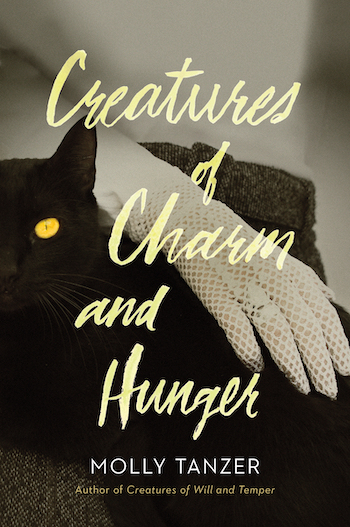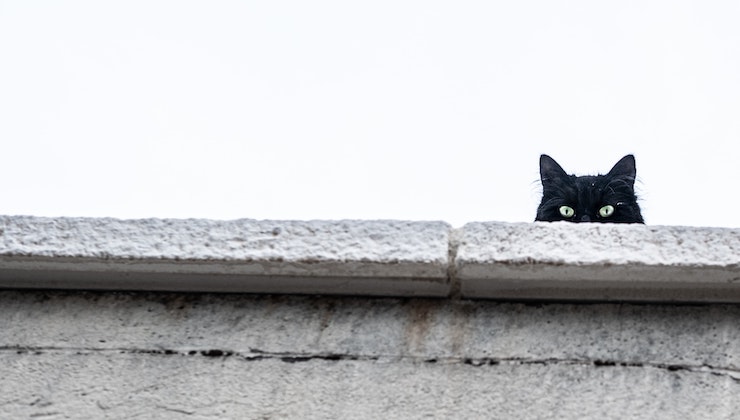The moment when suspicion and disbelief turn into awful, undeniable reality is a classic beat in the mode of supernatural horror. Until the monster, spirit, or other extramundane antagonist is revealed, there’s plausible deniability. Things might not be as bad as they seem! It might just be a branch that’s caught your jacket as you’re running through the woods. That sound might just be the cat.
But then, of course, things are every bit as bad as they seem. Or worse…
It’s also classic to have a skeptic who just won’t believe in the supernatural, no matter what. They hold the line for reason, but for too long. They resist the evidence before their eyes. It just can’t be. There must be a reasonable explanation.
Their undoing is, of course, that there isn’t one.
And then of course you have the overly credulous person who immediately assumes it’s a vampire, a cryptid, or Cthulhu. The wingnut with the wild theory—maybe even theories. But their eagerness to believe can doom them as frequently as obstinacy dooms the unbeliever.

Apple | Bookshop.org | Amazon | Barnes & Noble | IndieBound
Skepticism is powerful: a tool when carefully wielded, a weapon when employed recklessly. Sometimes, our eyes deceive us. Other times, they don’t. Knowing what to believe, and when, and how much… well, that is a fundamental human struggle, is it not? Discernment is an art as difficult to master as it is crucial. Without sufficient skepticism, we fall for confidence artists, scams, religious claims, and disinformation. With excess skepticism, we do the same. Those con-artists, scams, claims, and disinformation can be based as much on convincing us not to believe the truth as they can be about gaining our trust. Yes, I can heal you with a touch. No, there’s no economic crisis. When you look at all the evidence I have compiled, you must conclude that the experts are wrong.
The themes of skepticism and belief run through my trilogy of novels about demons and demon-summoning, The Diabolist’s Library. In the first book, Creatures of Will and Temper, our co-tagonists, sisters Evadne and Dorina Gray, don’t believe in demons and have never heard of diabolism. They’re country girls who come to London only to find that the city is full of many temptations, some of them supernatural. Evadne doesn’t want to believe; Dorina does—but in the end, they must both accept the truth before their eyes. In the second, Creatures of Want and Ruin, co-tagonists, new friends Ellie West and Delphine “Fin” Coulthead, are both a lot more worldly than the Gray sisters… and yet, they are as utterly shocked to find out that demons are real, and they have power over man and nature alike. Whether they can convince themselves and their friends to believe determines whether they—and a lot more people—survive the efforts of a sinister diabolist with a plan to remake the world as he sees fit.
For the final book of The Diabolist’s Library, Creatures of Charm and Hunger, I wanted to shake things up. I’d had enough of writing about people needing to be convinced that demons were real. I wanted my co-tagonists, Jane Blackwood and Miriam Cantor, to start off knowing that demons exist, and that diabolism is a potent practice. When the novel opens, they are both apprentices, both hoping to become full members of the Société des Éclairées, an international organization of diabolists. They know all about demons, and how to work with them.
So, what do they have to be skeptical of?
Now, it’s not that my leads in the other novels weren’t skeptical or credulous of more mundane matters—Evadne doesn’t believe that her sister’s mentor is a good influence; Fin isn’t quite willing to believe that her marriage is functionally over. But, by freeing Jane and Miriam from disbelief om the supernatural, I freed them up to disbelieve, and for that matter, believe in other things.
Skepticism is powerful: a tool when carefully wielded, a weapon when employed recklessly.
Miriam, a German-Jewish refugee, believes in her parents’ innocence when she hears they are accused of having betrayed the Société to the Nazis. She also believes her response—a dangerous bit of diablerie done to prove their faithfulness—is worth it, no matter the cost. Miriam is right about one of these things. The other? Well…
Jane, born and bred to diablerie, believes she has a right to mastery. So, when she fails her Test—a crucial part of the process—she disbelieves the result, and then she lies about it in order to continue with her studies. She is so convinced of her ability that she ends up breaking one of the most sacred taboos of all diabolists: she summons a demon into an animal. Not just any animal, either—she summons a demon into her pet cat, Smudge.
And it works! At least, Jane believes it has worked. The summoned demon is supposed to be entirely under her control, which means Smudge ends up entirely under her control—and normally, Smudge is about as obedient as any cat. But, when Smudge’s shadow starts to behave strangely, including blinking and even stretching on its own when it thinks Jane isn’t looking, Jane still manages to convince herself that no, surely her eyes were mistaken. It must have been a trick of the light. An illusion, the result of anxiety and stress.
It’s just the cat…
We live in a time when it’s harder than ever to exercise our discernment. We laugh about people on social media who get angry about an article in The Onion. How could they really believe public schools were abolishing the past tense due to budget cuts? But then, people go out and vote based on what they hear from even more ludicrous sources; ones with perhaps even less claim to the truth.
And yet, the experience of living in an age where it is in vogue to declare one’s self anti-fact throws other things into sharp relief. When I was first thinking about the story that would become Creatures of Charm and Hunger, foremost was how cool it would be to write a book about witches fighting Nazis. And I did! But one of the major motifs of the book ended up being, “How far would any of us go to avoid admitting we were wrong?”
And why shouldn’t it be? It is, after all, the major motif of the era in which it was written.



